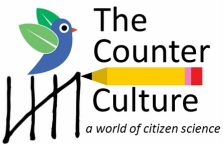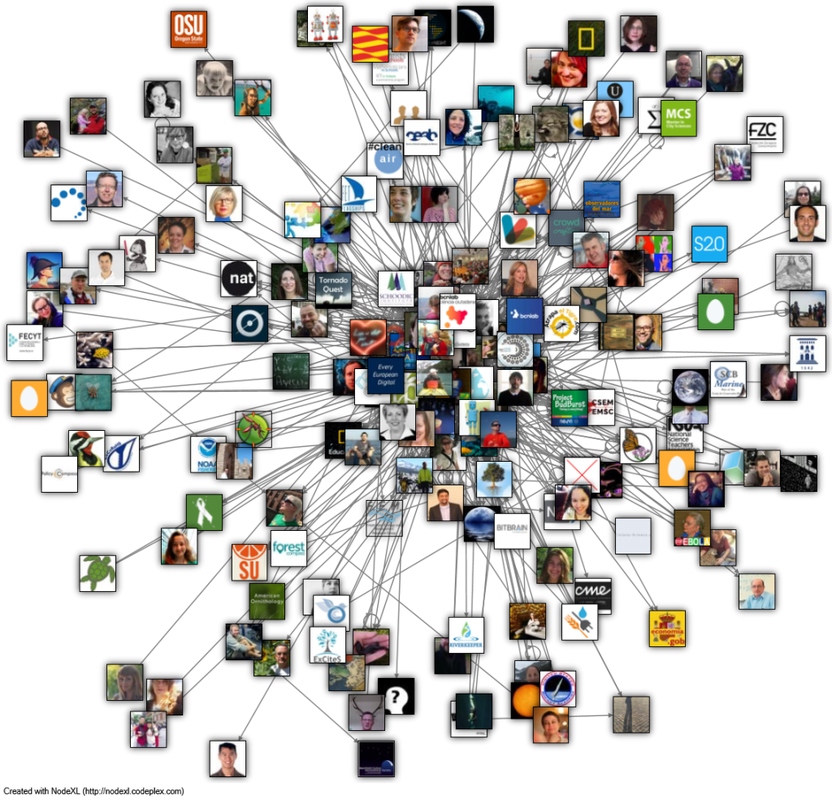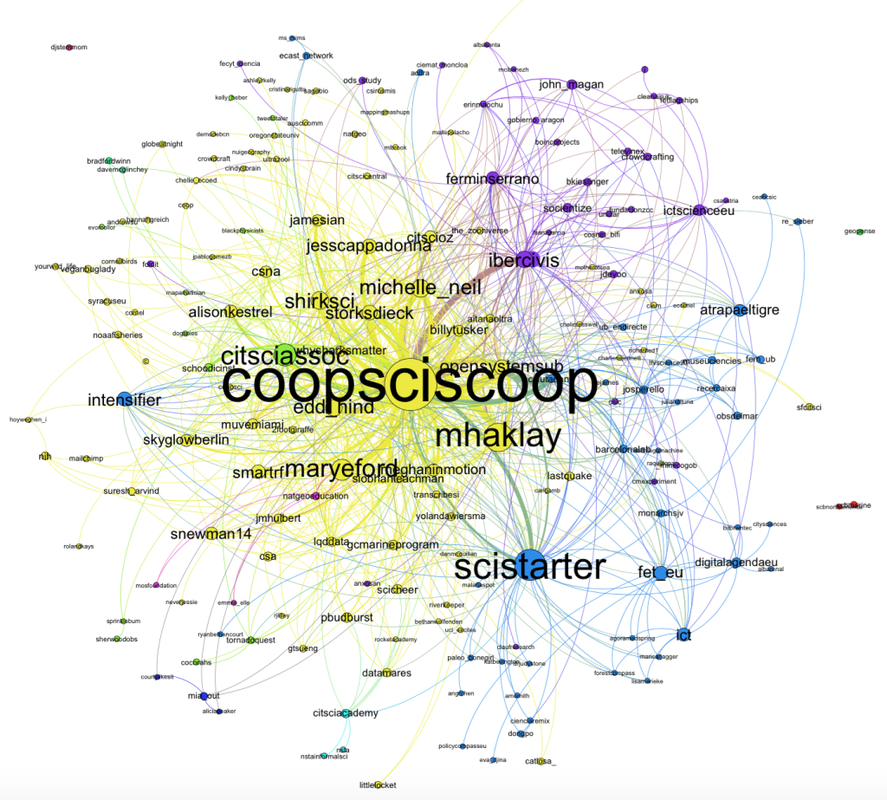A few days ago was the first #CitSciChat, sponsored by SciStarter and my lab (The Counter Culture). The #CitSciChat was a fast-paced and exhilarating hour of citizen science discussion. Guest panelist and many others carried out a lively conversation structured around questions that I posed over the hour. Twitter chats have a hilarious side because so many people can chime in at once, which creates a kind of crazy that we rarely do in person. It is near impossible to follow all the discussion, especially in the moment, but in the calm after the Twitter storm, it is easy to go back to the #CitSciChat stream or read a capture of the majority of tweets created in Storify. I'll summarize a little here.
In some ways, the #CitSciChat was like instant crowdsourcing. What are other names for citizen science, I asked. Within minutes we generated this list: Citizen Observatories, Responsible Research Innovation, Science 2.0, Smart Citizens, Fablabs, livinglabs, crowdsciences, crowdfunding, crowdsourcing, volunteered geographic information, civic science, public participation, Public participation in Scientific Research (PPSR), Amateur Science, Popular Science, Amateur naturalists, birdwatcher, butterfly collector, amateur astronomer, volunteer monitoring, volunteered science.
What disciplines are involved in citizen science? Within a few more minutes, we had this list: economics, deciphering handwriting, ecology, biology, social science, GIS, fisheries, education, arts, linguistics, geography, biochemistry, genetics, oceanography, physics, biotechnology, humanities, environmental monitoring, policy making, ethics, weather monitoring, ecology, environmental sciences, astronomy, geology, medical science, marine science, water quality, human-computer interactions, human health, seismology -- Transdisciplinary!
And it was noted - not chemistry.
We discussed the goals of associations, best practices, differences among countries, and activities of participants. There were provocative comments, including campaigning for tenure points for scientists who use best practices in citizen science. We discussed resources practitioners need, and responses included ethics, evaluation, computing and other tech.
I asked the Chatters about the pros and cons of associations. The quickly listed the following pros: democracy, visibility, efficiency, pervasive sci literacy, global, share, collaborate, network, respect and promoting citizen science, resources, collective learning, transparency, sustainable long-term communities. And the following cons: top-down, self-interest, hard to be global, echo chamber, me toos, can exclude volunteers, no longer novel to funders, over-professionalizing, don't silo citizen science from science. (Elsewhere, I'll summarize the Chatters hoped for outcomes of the upcoming CSA conference).
My favorite part was to learn what Chatters thought were the promising frontiers, and these included wearable citizen science, digital arts, collective intelligence, neurodata gathering, new societal values, the internet of things to generate data, dedicated funding lines for citizen science, projects sharing platforms and technologies and protocols, mobile tech, greater access globally, connecting silo'ed and distributed but related data, neurosynapitc processors, improved policy making, and sensor networks for biodiversity.
Thanks to researchers in Sweden, we know that there were just under 200 participants in the first #CitSciChat. This group created 867 interactions. They made this visualizations of the online network, with Twitter handles and avatars. Visit their blog post for more details and if you want to zoom in on the visualizations.
Thanks again to all who were involved. Try to find your profile picture below. I hope you'll jump into the February (25th) #CitSciChat too!
In some ways, the #CitSciChat was like instant crowdsourcing. What are other names for citizen science, I asked. Within minutes we generated this list: Citizen Observatories, Responsible Research Innovation, Science 2.0, Smart Citizens, Fablabs, livinglabs, crowdsciences, crowdfunding, crowdsourcing, volunteered geographic information, civic science, public participation, Public participation in Scientific Research (PPSR), Amateur Science, Popular Science, Amateur naturalists, birdwatcher, butterfly collector, amateur astronomer, volunteer monitoring, volunteered science.
What disciplines are involved in citizen science? Within a few more minutes, we had this list: economics, deciphering handwriting, ecology, biology, social science, GIS, fisheries, education, arts, linguistics, geography, biochemistry, genetics, oceanography, physics, biotechnology, humanities, environmental monitoring, policy making, ethics, weather monitoring, ecology, environmental sciences, astronomy, geology, medical science, marine science, water quality, human-computer interactions, human health, seismology -- Transdisciplinary!
And it was noted - not chemistry.
We discussed the goals of associations, best practices, differences among countries, and activities of participants. There were provocative comments, including campaigning for tenure points for scientists who use best practices in citizen science. We discussed resources practitioners need, and responses included ethics, evaluation, computing and other tech.
I asked the Chatters about the pros and cons of associations. The quickly listed the following pros: democracy, visibility, efficiency, pervasive sci literacy, global, share, collaborate, network, respect and promoting citizen science, resources, collective learning, transparency, sustainable long-term communities. And the following cons: top-down, self-interest, hard to be global, echo chamber, me toos, can exclude volunteers, no longer novel to funders, over-professionalizing, don't silo citizen science from science. (Elsewhere, I'll summarize the Chatters hoped for outcomes of the upcoming CSA conference).
My favorite part was to learn what Chatters thought were the promising frontiers, and these included wearable citizen science, digital arts, collective intelligence, neurodata gathering, new societal values, the internet of things to generate data, dedicated funding lines for citizen science, projects sharing platforms and technologies and protocols, mobile tech, greater access globally, connecting silo'ed and distributed but related data, neurosynapitc processors, improved policy making, and sensor networks for biodiversity.
Thanks to researchers in Sweden, we know that there were just under 200 participants in the first #CitSciChat. This group created 867 interactions. They made this visualizations of the online network, with Twitter handles and avatars. Visit their blog post for more details and if you want to zoom in on the visualizations.
Thanks again to all who were involved. Try to find your profile picture below. I hope you'll jump into the February (25th) #CitSciChat too!



 RSS Feed
RSS Feed
